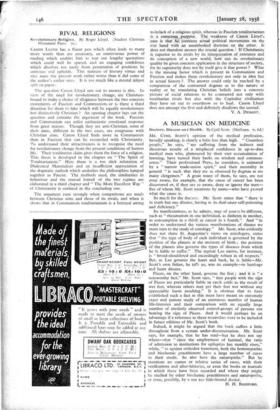RIVAL RELIGIONS
CANON LLOYD has a fluent pen which often leads to many more words than are necessary, an omnivorous power of reading which enables him to tear out lengthy quotations which could well be spared, and an engaging confidence which absolves too easily from penetration of positions he criticises and upholds. This mixture of literary virtue and vice mars the present work rather worse than it did some of the author's earlier ones. It is too much like a mental inkpot spilt on paper.
The question Canon Lloyd sets out to answer is this. In View of the need for revolutionary_ change, are Christians bound to make a choice of allegiance between the two concrete movements of Fascism and Communism, or is there a third direction for them to take which will be equally revolutionary but distinctively' Christian ? An opening chapter lays out the question and contains the argument of the book. Fascism and Communism can enlist enthusiastic emotional response from great masses. Though they are anti-Christian, some of their aims, different in the two cases, are congruous with Christian aims. 'Canon Lloyd finds more in Communism than in Fascism that can be reconciled with Christianity. To understand their attractiveness is 'to recognise the need for revolutionary change from the present conditions of human life. Their totalitarian claim gives them the force of a religion. This thesis is developed in the chapter on " The Spirit of Totalitarianism." Here there is a too slick refutation of Dialectical Materialism and an insufficient appreciation of the dogmatic outlook which underlies the philosophies lumped together as Fascist. The methods used, the similarities in behaviour and the mutual hatred of the two regimes are elaborated in a third chapter and " The More Excellent Way " of Christianity is outlined in the concluding one.
The argument runs strongly when comparisons are made between Christian aims and those of its rivals, and when it shows that in Communism totalitarianism is a betrayal owing
to its lack. of a religious spirit, whereas in Fascism totalitarianism is a conscious punxise. The.. weal-mess of Canon Lloyd's - , .
case is that he contrasts actual polittcal movements on the One hand with an unembodied doctrine on the other. It . does not therefore answer the crucial question If thristianity
is superior to its rivals by its interpretation of existence and .
its conception of a new world, hoyf can its revolutionary quality be given concrete application in the structure of society, for its superiority does riot by itself give it that power ? What is the missing factor . which is present in Communism and Fascism and makes them revolutionary not only in idea but in actual- history ? • The answer could only be reached by a comparison of the . contrasted dogmas as to the- nature of reality , or by translating Christian beliefs into a concrete picture of social relations to be contrasted not only with totalitarian rivals but also with the Capitalist civilisation they have set out to overthrow or to heal. Canon Lloyd does not attempt the first and definitely disallows the second.
V. A. DEMANT.


















































 Previous page
Previous page